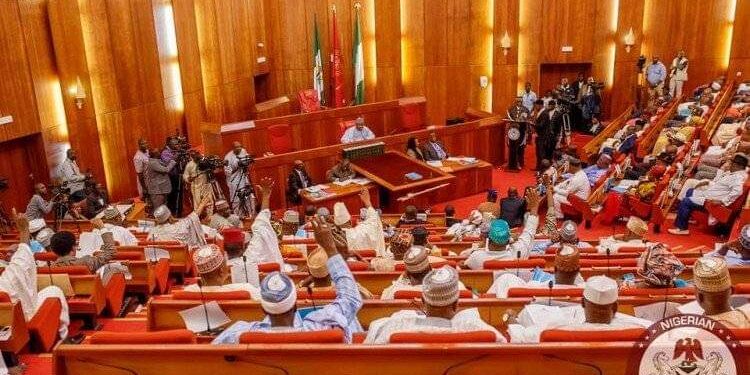…N200bn for special intervention
Abubakar Yunusa, Abuja
The Senate has approved the 2024-2026 Medium Term Expenditure Framework (MTEF) and Fiscal Strategy Paper (FSP).
The Senate has also ordered investigation into all tax waivers from 2015 till date and directed that all waivers not directly linked to non-governmental/non-profit organizations should not be granted.
The Senate said that before waiver can be approved, there are certain conditions attached, adding that some people have been benefitting from the waiver year in, year out.
Addressing newsmen, shortly after the plenary, the Chairman of the Joint Senate Committees on Finance, Appropriations, National Planning and Foreign Debt, Senator Sani Musa, lamented that so much has been lost to the waiver.
He said: “We cannot continue to talk of waiver, while we kill our local manufacturers.
What we have today are cartels, who are not given back to Nigeria. We will take the bull by the horn.“
He said that Customs told the Senate that the nation lost about N1.3 trillion to waiver, adding that it doesn’t make any economic sense, when waiver is granted and nothing is gained.
In the report of the Senate Joint Committees, President Bola Ahmed Tinubu will borrow N7.8 trillion to fund the 2024 budget of N26 trillion that will be presented to the National Assembly soon.
In the budget, N8.2 trillion is earmarked for debt services.
In the report presented for consideration on the floor of the Senate, Sani Musa revealed that the Federal government projected the reduction in inflation from 27.33 % to 21.4% in 2024.
“The total budget for 2024 will be N26 trillion with N16.9 trillion in retained revenue, N243.6 billion for the sinking fund, the statutory transfer for the budget will be N1.3 trillion, N1.2 trillion. In pension gratuity and retirees benefits.
“The total recurrent (non-debt) of N10.2 trillion, personal cost of MDAs- N4.49 trillion, capital expenditure (exclusive of transfers) -N5.9 trillion, special Intervention (recurrent)- N200 billion and special Intervention capital -N7 billion comprise the aggregate of Federal government expenditure of N26 trillion,” the report said.
The report further reads: “Following the criteria in the overview of the framework for revenues and expenses, which forms the basis of the 2024 FGN budget FGN proposed spending N26 trillion, of which N16.9 trillion was retained, new borrowings of N7.8 trillion (including borrowing from foreign and domestic), debt service to revenue ratio of 49%, pension, gratuities, and retiree benefits of N12 trillion, and a fiscal deficit of N9 trillion (including GOES)
“The projected N16.96 trillion revenues to the federal government for the 2024 fiscal year is attainable with effective revenue monitoring exercise and oversight by the relevant Committees of the National Assembly.
“The projected fiscal deficit of N9.048 trillion, N10.02 and N11.48 proposed for the 2024, 2025 and 2026 fiscal years are 22%, 13.6% and 1% lower than the N11 6 trillion fiscal deficit for the year 2023. The proposed strategy for the government in 2024 towards deficit financing is to increase funding from privatization proceeds and foreign borrowing and reduce funding from multilateral and bilateral project- tied loans, and domestic borrowing
“The Federal Government’s commitments to progressively restructure its debt portfolio towards achieving a balanced domestic-to-external debt ratio is evident in the 2024-2026 MTEF and FSP
“A significant number of the Federal Government’s Revenue- Generating Agencies engaged in arbitrary, frivolous and extra-budgetary expenditure.”
The oil benchmark is pegged at $73.6 per barrel with daily production of 1.78 million barrels per day with an exchange rate of N700 to $1.











